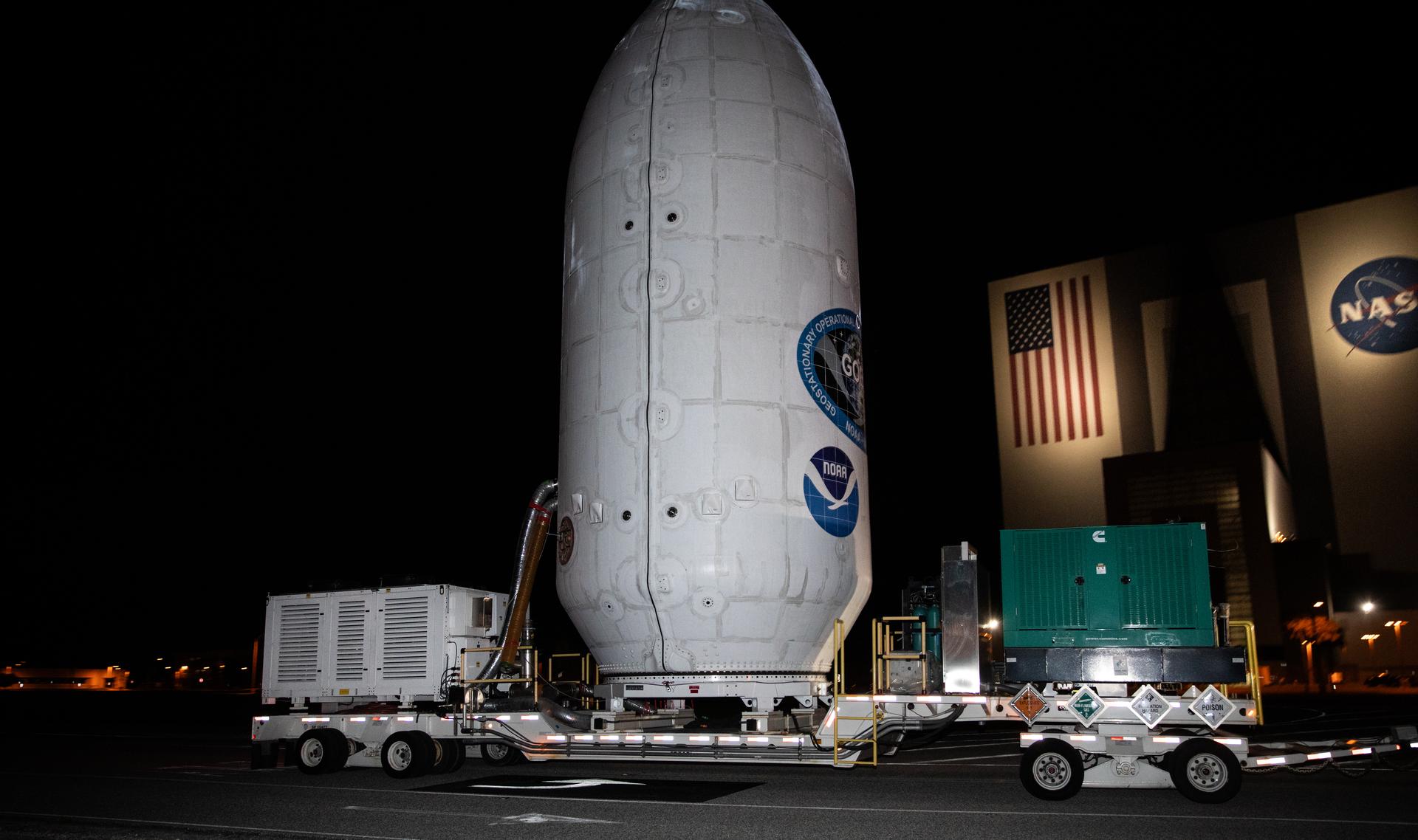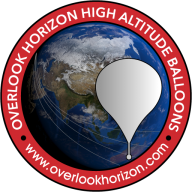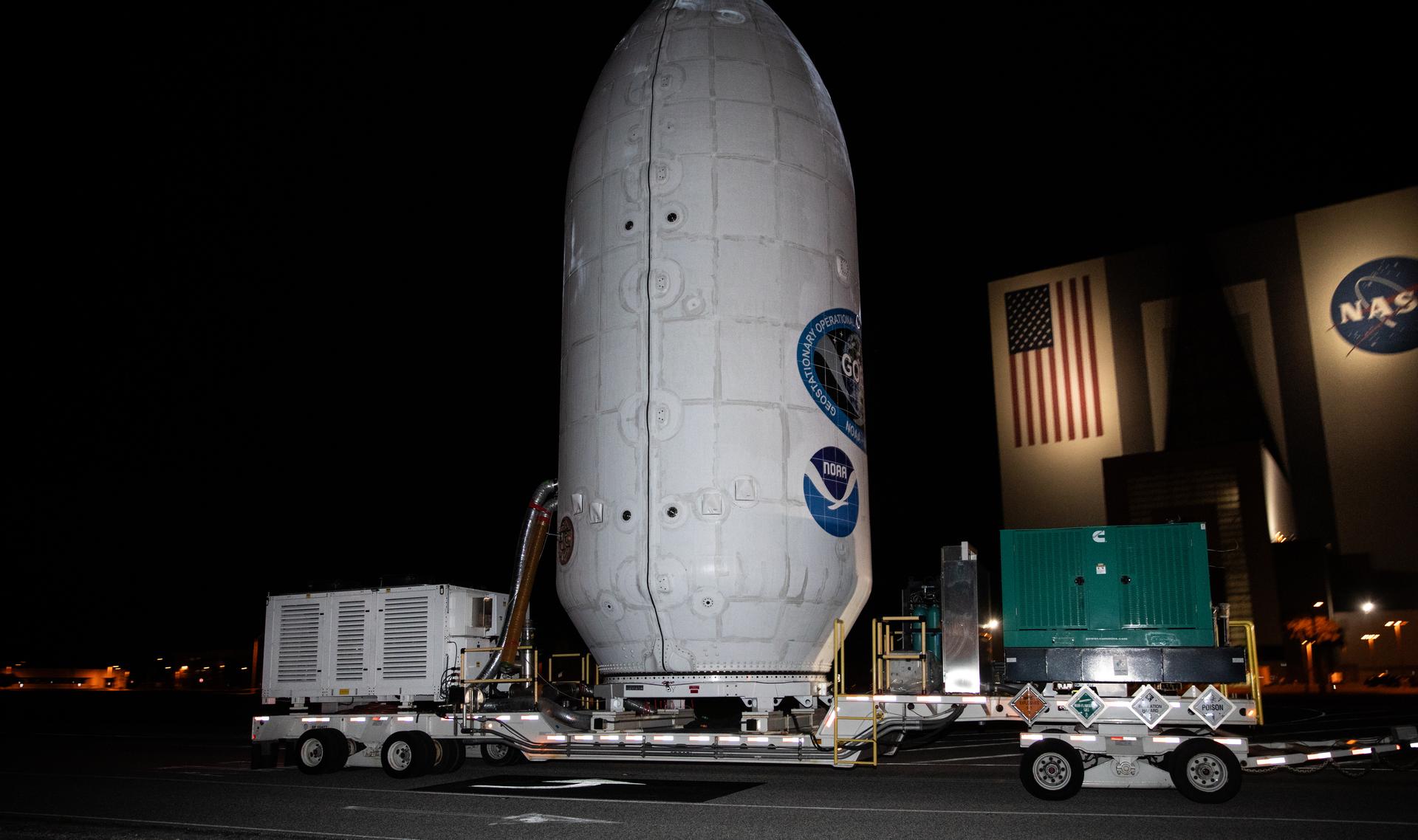 Crews transport NOAA’s (National Oceanic and Atmospheric Administration) Geostationary Operational Environmental Satellite (GOES-U) from the Astrotech Space Operations facility to the SpaceX hangar at Launch Complex 39A at NASA’s Kennedy Space Center in Florida beginning on Friday, June 14, 2024, with the operation finishing early Saturday, June 15, 2024. The fourth and final weather-observing and environmental monitoring satellite in NOAA’s GOES-R Series will assist meteorologists in providing advanced weather forecasting and warning capabilities. The two-hour window for liftoff opens 5:16 p.m. EDT Tuesday, June 25, aboard a SpaceX Falcon Heavy rocket from Launch Complex 39A at NASA’s Kennedy Space Center in Florida. (NASA/Ben Smegelsky) NASA will provide live coverage of prelaunch and launch activities for the National Oceanic and Atmospheric Administration’s (NOAA) GOES-U (Geostationary Operational Environmental Satellite U) mission. The two-hour launch window opens at 5:16 p.m. EDT Tuesday, June 25, for the satellite’s launch on a SpaceX Falcon Heavy rocket from Launch Complex 39A at NASA’s Kennedy Space Center in Florida.
Crews transport NOAA’s (National Oceanic and Atmospheric Administration) Geostationary Operational Environmental Satellite (GOES-U) from the Astrotech Space Operations facility to the SpaceX hangar at Launch Complex 39A at NASA’s Kennedy Space Center in Florida beginning on Friday, June 14, 2024, with the operation finishing early Saturday, June 15, 2024. The fourth and final weather-observing and environmental monitoring satellite in NOAA’s GOES-R Series will assist meteorologists in providing advanced weather forecasting and warning capabilities. The two-hour window for liftoff opens 5:16 p.m. EDT Tuesday, June 25, aboard a SpaceX Falcon Heavy rocket from Launch Complex 39A at NASA’s Kennedy Space Center in Florida. (NASA/Ben Smegelsky) NASA will provide live coverage of prelaunch and launch activities for the National Oceanic and Atmospheric Administration’s (NOAA) GOES-U (Geostationary Operational Environmental Satellite U) mission. The two-hour launch window opens at 5:16 p.m. EDT Tuesday, June 25, for the satellite’s launch on a SpaceX Falcon Heavy rocket from Launch Complex 39A at NASA’s Kennedy Space Center in Florida.
The GOES-U satellite, the final addition to GOES-R series, will help to prepare for two kinds of weather — Earth and space weather. The GOES satellites serve a critical role in providing continuous coverage of the Western Hemisphere, including monitoring tropical systems in the eastern Pacific and Atlantic oceans. This continuous monitoring aids scientists and forecasters in issuing timely warnings and forecasts to help protect the one billion people who live and work in the Americas. Additionally, GOES-U carries a new compact coronagraph that will image the outer layer of the Sun’s atmosphere to detect and characterize coronal mass ejections.
The deadline for media accreditation for in-person coverage of this launch has passed. NASA’s media credentialing policy is available online. For questions about media accreditation, please email: ksc-media-accreditat@mail.nasa.gov.
NASA’s mission coverage is as follows (all times Eastern and subject to change based on real-time operations):
Monday, June 24
9:30 a.m. – NASA EDGE GOES-U prelaunch show on NASA+, the NASA app, and the agency’s website.
11 a.m. – GOES-U science briefing with the following participants:
Charles Webb, deputy director, Joint Agency Satellite Division, NASA Ken Graham, director, NOAA’s National Weather Service Dan Lindsey, chief scientist, GOES-R Program, NOAA Elsayed Talaat, director, NOAA’s Office of Space Weather Observations Chris Wood, NOAA Hurricane Hunter pilot Coverage of the science news conference will stream live on NASA+, the NASA app, YouTube, and the agency’s website.
Media may ask questions in person and via phone. Limited auditorium space will be available for in-person participation. For the dial-in number and passcode, media should contact the Kennedy newsroom no later than one hour before the start of the event at ksc-newsroom@mail.nasa.gov.
3:15 p.m. – NASA Social panel at Kennedy with the following participants:
Jade Zsiros, telemetry engineer, NASA’s Launch Services Program Ellen Ramirez, deputy division chief, Mission Operations Division, National Environmental Satellite, Data, and Information Service Office of Satellite and Product Operations, NOAA Dakota Smith, satellite analyst and communicator, NOAA’s Cooperative Institute for Research in the Atmosphere Allana Nepomuceno, senior manager, GOES-U Assembly, Test, and Launch Operations, Lockheed Martin Chris Reith, program manager, Advanced Baseline Imager, L3Harris Technologies The panel will stream live on NASA Kennedy’s YouTube, X and Facebook accounts. Members of the public may ask questions online by posting to the YouTube, X, and Facebook live streams or using #AskNASA.
5 p.m. – Prelaunch news conference at Kennedy (following completion of the Launch Readiness Review), with the following participants:
Denton Gibson, launch director, Launch Services Program, NASA Steve Volz, assistant administrator, NOAA’s Satellite and Information Service Pam Sullivan, director, GOES-R Program, NOAA John Gagosian, director, Joint Agency Satellite Division Julianna Scheiman, director, NASA Science Missions, SpaceX Brian Cizek, launch weather officer, 45th Weather Squadron, U.S. Space Force Coverage of the prelaunch news conference will stream live on NASA+, the NASA app, YouTube, and the agency’s website.
Media may ask questions in person and via phone. Limited auditorium space will be available for in-person participation. For the dial-in number and passcode, media should contact the Kennedy newsroom no later than one hour before the start of the event at ksc-newsroom@mail.nasa.gov.
Tuesday, June 25
1 p.m. – Media one-on-one interviews with the following:
Michael Morgan, Assistant Secretary of Commerce for Environmental Observation and Prediction, NOAA Michael Brennan, director, NOAA’s National Hurricane Center James Spann, senior scientist, Office of Space Weather Observations, NOAA John Gagosian, director, Joint Agency Satellite Division Krizia Negron, language program lead, National Weather Service Office of Science and Technology Integration, NOAA (bilingual, available for Spanish interviews) Dan Lindsey, chief scientist, GOES-R Program, NOAA Jagdeep Shergill, program director, GEO Weather, Lockheed Martin Chris Reith, program manager, Advanced Baseline Imager, L3Harris Technologies 4:15 p.m. – NASA launch coverage begins on NASA+, the agency’s website, and other digital channels.
5:16 p.m. – Two-hour launch window opens
Audio Only Coverage
Audio only of the news conferences and launch coverage will be carried on the NASA “V” circuits, which may be accessed by dialing 321-867-1220, -1240 or -7135. On launch day, “mission audio,” countdown activities without NASA Television media launch commentary, will be carried on 321-867-7135.
Live Video Coverage Prior to Launch
NASA will provide a live video feed of Launch Complex 39A approximately 24 hours prior to the planned liftoff of the mission on NASA Kennedy’s YouTube: https://youtube.com/kscnewsroom. The feed will be uninterrupted until the prelaunch broadcast begins on NASA Television media channel.
NASA Website Launch Coverage
Launch day coverage of the mission will be available on the agency’s website. Coverage will include live streaming and blog updates beginning no earlier than 3 p.m., June 25, as the countdown milestones occur. On-demand streaming video and photos of the launch will be available shortly after liftoff.
For questions about countdown coverage, contact the Kennedy newsroom at 321-867-2468. Follow countdown coverage on the GOES blog.
Para obtener información sobre cobertura en español en el Centro Espacial Kennedy o si desea solicitar entrevistas en español, comuníquese con Antonia Jaramillo: antonia.jaramillobotero@nasa.gov o Messod Bendayan: messod.c.bendayan@nasa.gov
Attend the Launch Virtually
Members of the public can register to attend this launch virtually. NASA’s virtual guest program for this mission also includes curated launch resources, notifications about related opportunities or changes, and a stamp for the NASA virtual guest passport following launch.
Watch, Engage on Social Media
Let people know you’re following the mission on X, Facebook, and Instagram by using the hashtags #ReadyToGOES and #NASASocial. You can also stay connected by following and tagging these accounts:
X: @NASA, @NASA_LSP, @NASAKennedy, @NOAASatellites, @NASAGoddard
Facebook: NASA, NASA LSP, NASA Kennedy, NOAA Satellites, NASA Goddard
Instagram: NASA, NASA Kennedy, NOAA Satellites
For more information about the mission, visit:
-end-
Liz Vlock
Headquarters, Washington
202-358-1600
elizabeth.a.vlock@nasa.gov
Peter Jacobs
Goddard Space Flight Center, Greenbelt, Maryland
301-286-0535
peter.jacobs@nasa.gov
Leejay Lockhart
Kennedy Space Center, Florida
321-747-8310
leejay.lockhart@nasa.gov


